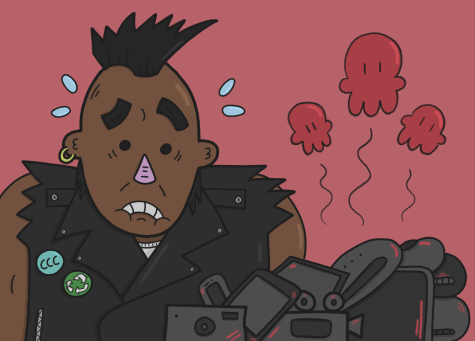University Center to host Earth Day e-waste drive for the Columbia community to donate old tech
April 19, 2022

An old iPhone in a drawer is collecting dust, and the new monitor you got looks perfect, but your old one is left sitting in a corner. You want to do the right thing but don’t know where to recycle it, and you are worried about your personal information being stolen from the device.
The Vowe Electronics Earth Day e-waste drive, which will take place on April 22 in the University Center lobby, 525 S. State St., will provide a convenient solution.
Students, staff and faculty, who are Chicago residents with valid state or college IDs, can bring the tech items they no longer use or need to recycle.
Vowe Electronics is hosting this event in partnership with Columbia’s “Agency” class through its membership with 1871, a Chicago-based, nonprofit private business incubator. The decision was made to hold the event at the University Center due to the big population of students residing there from different colleges across the city and the convenience it brings.
Prior to hearing about this event, Ruth Johnson, a junior journalism major, was unfamiliar with the meaning of “e-waste.”
“I’ve never really known how technology gets recycled or reused,” Johnson said. “When I‘ve had old laptops breakdown, I give them back to stores that say they buy them back, but I’ve never really known what they do with that.”
Alec Atlas, CEO and owner of Vowe Electronics, is currently completing his master’s degree in business at the Kellogg School of Management at Northwestern University. The idea for Vowe Electronics was originally created for a class he took called “New Venture.” Atlas said he was inspired by his dad asking him to get rid of the old electronics in their basement.
“I care about e-waste because it’s the fastest growing waste stream in the world,” Atlas said. “E-waste is not easy to get rid of. You have to worry about the data; some of that data you want to keep. Once you take care of all that, ‘where do you bring it? How do you make sure you’re disposing of it safely?’ The moment I saw how much old tech my dad had, the light bulb moment happened, and Vowe Electronics was born based on a consumer, global and environmental perspective.”
After collecting the electronics, Atlas brings them to the City of Chicago, and they are recycled with an R2 certified recycler. This certification holds recycling businesses to standards that include protecting the environment, keeping workers safe and healthy, and positively impacting the sustainable economy movement.
Sustainable Electronics Recycling International — a nonprofit based in Washington, D.C., dedicated to responsible reuse and recycling of electronics — has been a home for the R2 program since 2014.
Corey Dehmey, executive director at SERI, said the company always wants to look at the potential for reuse of the device or parts of it by people in the U.S. or abroad before recycling them. Electronic parts like chips are currently in short supply, and many companies are trying to buy them.
Dehmey suggests users should perform a master reset to erase all personal information on a device and disconnect all the accounts associated with the user before donating it.
If for some reason personal information is not or cannot be erased off a device, the R2 facility will access it for the data and then override or physically destroy it by shredding or degaussing, Dehmey said.
“Let’s not hold on to [old devices], let’s get them into the hands of people who can actually use them and can bridge this digital divide,” Dehmey said.
Terry Sheahan, the hazardous materials program coordinator at the Chicago Department of Public Health, said its recycler company gets a recycling rate of 98%. In 2021, they recycled 492,000 pounds of e-waste at their facilities.
The environment is not the only concern when it comes to e-waste. While Atlas primarily focuses on the environmental portion of e-waste, he said conflict minerals — tantalum, tungsten, tin and gold — are used in our everyday technology, like phones and laptops. These minerals are mined in countries like the Democratic Republic of Congo, Russia, Argentina and Canada. Recycling electronics is a positive thing because it in turn lessens the need for new manufacturing, he said.
For more information about the Vowe Earth Day e-waste drive event, click here. A list of accepted items can be found here.







